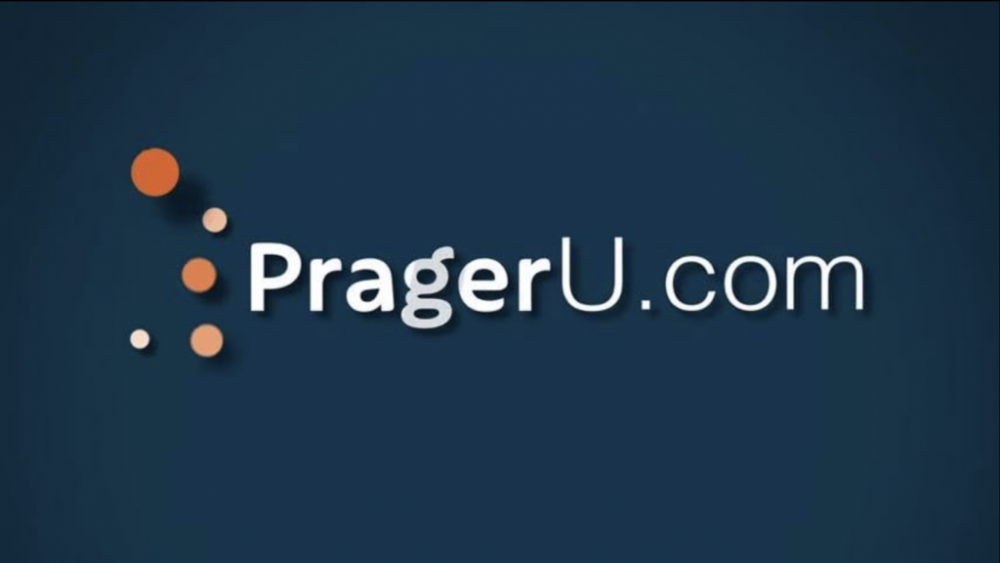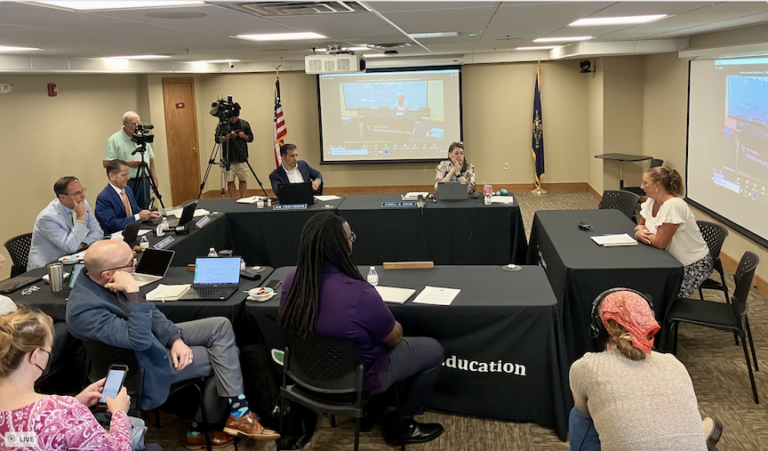
PragerU is a right-leaning media nonprofit that produces videos providing lessons on history, politics, and social issues with a conservative perspective. (Screenshot)
The New Hampshire State Board of Education tabled a proposal Thursday that would allow public school students to take a financial literacy course from PragerU, a conservative media organization, amid strong pushback from educators.
In a voice vote, the board decided to delay the vote for at least another month. Chairman Drew Cline argued that more information was needed about how the nonprofit organization would separate the financial literacy videos from its more politically contentious content.
Educators, school advocates, and Democratic officials had lodged strong objections to the proposal, arguing that PragerU is a politically driven organization and that the approval of the financial literacy program could lead students to its more ideological content.
If approved, the motion would have allowed the PragerU program to be accepted as part of the state’s Learn Everywhere program. Learn Everywhere lets public school students enroll in educational programs from approved organizations and companies outside of their school district as a means to get alternative credits for graduation.
PragerU is a right-leaning media nonprofit that produces videos providing lessons on history, politics, and social issues with a conservative perspective. The organization’s financial literacy program, Cash Course, consists of 15, five-minute videos on topics ranging from how to pay taxes to how to get health insurance.
The videos feature smooth graphics, young actors, narration, and music. After watching them, students are then asked to take a multiple-choice exam to demonstrate their understanding. If approved by the board, passage of that exam would allow the student to earn credit toward graduation.
The program, which has been approved for use in Florida, Texas, and Montana, was presented by the New Hampshire Department of Education as a tool to allow students to learn key life skills in a convenient and remote format. And supporters stressed that the program was separate from PragerU’s more controversial and politically charged videos.
But opponents assailed the state’s attempt to partner with PragerU in the first place, which they said was a tacit approval of the nonprofit’s other videos. Some said that allowing students to earn credit by watching the financial literacy videos could lead them to explore the organization’s other videos; others said that simply using videos with the PragerU logo would suggest the state was endorsing its other content.
Co-founded in 2009 by conservative talk show host Dennis Prager, PragerU has produced dozens of videos for adults and students on topics ranging from the history of slavery to climate change, largely presented from a conservative viewpoint. The organization has posted videos arguing against the notion that police officers have racial bias, downplaying the existence of a gender pay gap, and disputing the science of climate change. And it frequently features speeches and presentations from right-wing commentators talking about social topics.

National Education Association of New Hampshire President Megan Tuttle (right) testifies to the State Board of Education against the approval of a financial literacy program from PragerU, a conservative media nonprofit, on Aug. 10, 2023. (Screenshot)
Education Commissioner Frank Edelblut argued that the financial literacy program being contemplated for New Hampshire’s Learn Everywhere program should be differentiated from PragerU’s other videos. The financial literacy videos, he said, are well-produced and informative. And he said the program was similar in content to one already approved by the State Board of Education: FitMoney. Public school students can currently use that program to earn a half credit toward financial literacy instruction.
Speaking to the board after the vote, Edelblut expressed his disappointment in the decision to table, and said the board was edging toward a precedent of rejecting an application due to criteria beyond the basic requirements of a course.
“This board has created what I would refer to as a shifting sand for applicants,” he said during the meeting. “Individuals are looking at this board and they’re trying to understand what the expectation is and then that expectation is moving in the process.”
Edelblut also argued that teachers already deploy educational videos and content from organizations that could be seen as ideological, and that the state had approved programs from similar organizations. He did not provide examples in his remarks.
Many state board members appeared supportive of the PragerU application Thursday.
Still, Cline said that he wanted more information about PragerU’s pledge to post the financial videos for New Hampshire students on a website separate from its main website. And he said he wanted to get more details on the multiple choice questionnaire given to students after watching the videos, so that the board could determine whether the course should count as a quarter credit or half credit toward graduation.
“We’ve heard a lot of testimony that the content is strong,” he said. “There wasn’t a lot of objections to the content itself in the Cash Course. There were a lot of concerns about the context in which that content is presented and being able to see other stuff on the website.”
The opposition Thursday was not limited to PragerU’s political content. In testimony to the state board Thursday morning, some educators criticized the online financial literacy program itself, arguing that it did not provide sufficient instruction time and assessment to take the place of instruction carried out in schools. Those critics said the multiple choice test didn’t have the same rigor as the hands-on projects assigned to students in many school financial literacy programs.
“I did watch some of the videos and they are well-produced,” said Mark MacLean, the executive director of the New Hampshire School Administrators Association. “And I was a former business computer economics teacher, so I can say that the content was good. I just don’t think as a standalone it’s enough to provide students what they need for any sort of comprehensive financial literacy.”
The proposal comes a year after the Legislature passed a law requiring that financial literacy be taught as part of public school curricula. That law, passed through House Bill 1671, added “personal finance literacy” as a core requirement for schools to meet in order to provide an adequate education as required by the state constitution. That requirement takes effect in the 2023-2024 school year.
“The Legislature felt financial literacy is important enough to put in the core domain areas through high school,” said Megan Tuttle, president of the National Education Association of New Hampshire, a teachers union. “Five-minute videos is not what they were talking about. This is doing a disservice to competency-based education.”
The Learn Everywhere program, created by lawmakers in 2018 and put into effect in 2020, allows the State Board of Education to approve educational programs from organizations and companies it deems appropriate, and requires school districts to accept any credits earned by students in approved programs.
The board, whose members are appointed by Gov. Chris Sununu and approved by the Executive Council, meets next on Thursday, Sept. 14.
This story is courtesy of NH Bulletin under creative commons license. No changes have been made to the article.

 Current Issue - April 2024
Current Issue - April 2024